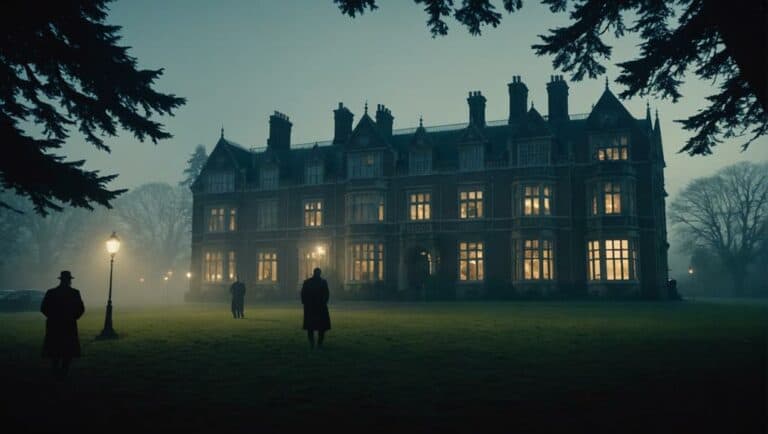At Bletchley Park, remarkable women like Joan Clarke and Mavis Batey cracked Nazi codes, significantly impacting WWII's outcome, yet their contributions remained unsung for years.
Discover how these brilliant codebreakers from Newnham College reshaped history with their expertise in decryption and intelligence.
Contributions of Women Code Breakers
During WWII, women code breakers at Bletchley Park played pivotal roles in deciphering complex German communications, greatly impacting the Allied war effort. These women, many of whom were students from Newnham College, worked tirelessly to crack the Enigma machine's codes. Their contributions were essential in providing the Allied forces with critical intelligence that often determined the outcome of military operations.
On D-Day, around 50 women were on duty at Bletchley Park, aiding in the planning for the liberation of Europe by analyzing German signal networks. Their work in deciphering encrypted communications allowed the Allies to anticipate and counter enemy strategies effectively. Historians like Sally Waugh and Jonathan Byrne have highlighted the significance of these women's contributions, noting that their efforts likely shortened WWII by several years.
The meticulous and often under-acknowledged work of these women was fundamental in turning the tide of the war. By breaking the Enigma codes, they provided invaluable insights that shaped the strategic decisions of the Allied forces. Their contributions at Bletchley Park not only had a profound impact during WWII but also left a lasting legacy in the field of intelligence operations.
Notable Female Code Breakers
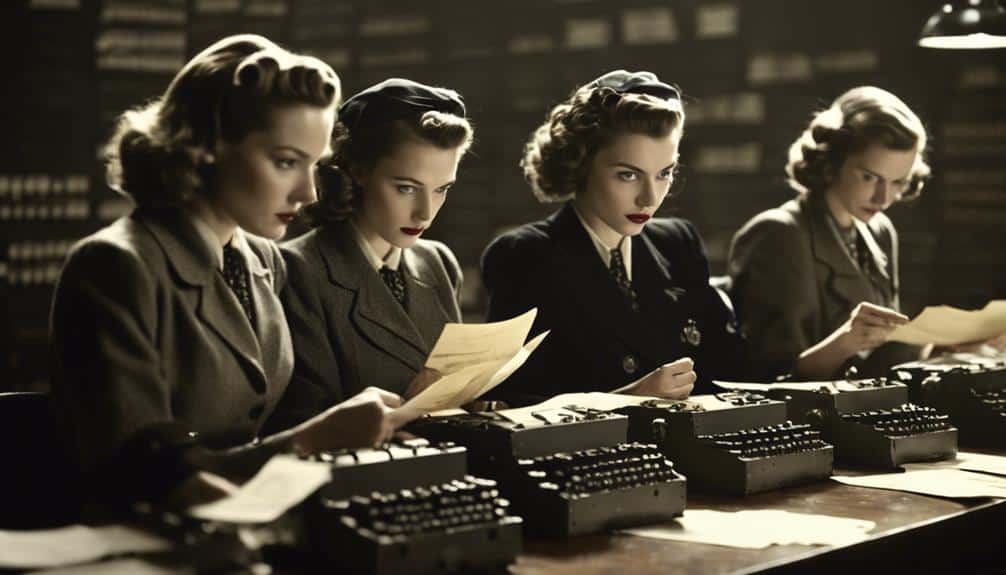
While often overshadowed by their male counterparts, several extraordinary women at Bletchley Park made groundbreaking contributions to the Allied codebreaking efforts during WWII. Joan Clarke, a brilliant mathematician, worked closely with Alan Turing. Her analytical prowess was instrumental in deciphering the Enigma Code, a vital component of German encryption. Clarke's role in codebreaking highlights the essential contributions of female code breakers.
Mavis Batey, another exceptional figure, decoded a message that exposed a planned Italian naval attack. This breakthrough not only showcased her skill but also underscored the strategic importance of code breaking in the war effort.
Elizabeth Langstaff's fluency in German allowed her to reconstruct decoded messages, significantly aiding intelligence analysis at Bletchley.
Additionally, Violet Cane, a statistician, specialized in naval signals. Her work on decrypting enemy communications was crucial for the Allies.
Alda Milner-Barry, Pernel Strachey, and Ray Strachey played key roles in recruiting and organizing women for Bletchley's vital tasks.
These unsung heroes, through their expertise and determination, were pivotal in unraveling German encryption. Their contributions remain a testament to the vital impact of female code breakers at Bletchley Park.
Recognition and Impact
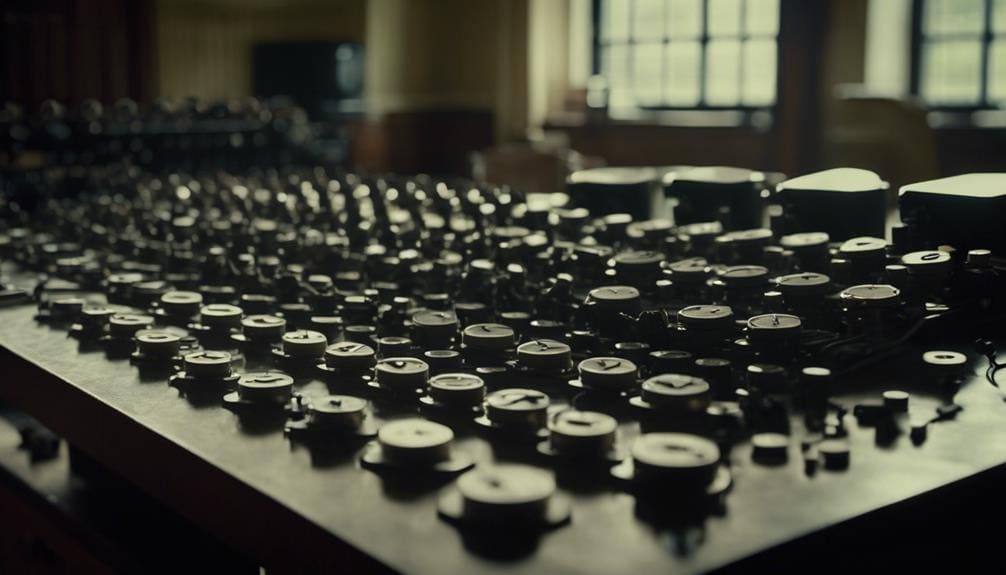
The recognition and impact of Bletchley Park's codebreakers, particularly the women, have grown considerably as historians and scholars reveal their indispensable contributions to the Allied victory in WWII. The efforts to decode the Enigma machine and other cryptographic systems at Bletchley Park were essential for Allied intelligence operations. By deciphering communications, these codebreakers provided crucial information that significantly influenced strategic decisions, including the success of D-Day.
Women codebreakers played a pivotal role at Bletchley Park, with many coming from Newnham College. They meticulously analyzed signal networks and decrypted messages, directly aiding the Allies' planning and execution during key WWII moments. The work of these women, once shrouded in secrecy, is now recognized for its profound impact on shortening the war.
Research by scholars such as Sally Waugh has uncovered that around 80 women from Newnham College made noteworthy contributions at Bletchley Park. This acknowledgment underscores the vital role women played in Allied intelligence. The historical narrative has shifted to include these unsung heroes, whose expertise in deciphering encrypted German messages was essential to the Allied war effort. Their legacy is now firmly cemented in the annals of WWII history.
Research on Women's Roles
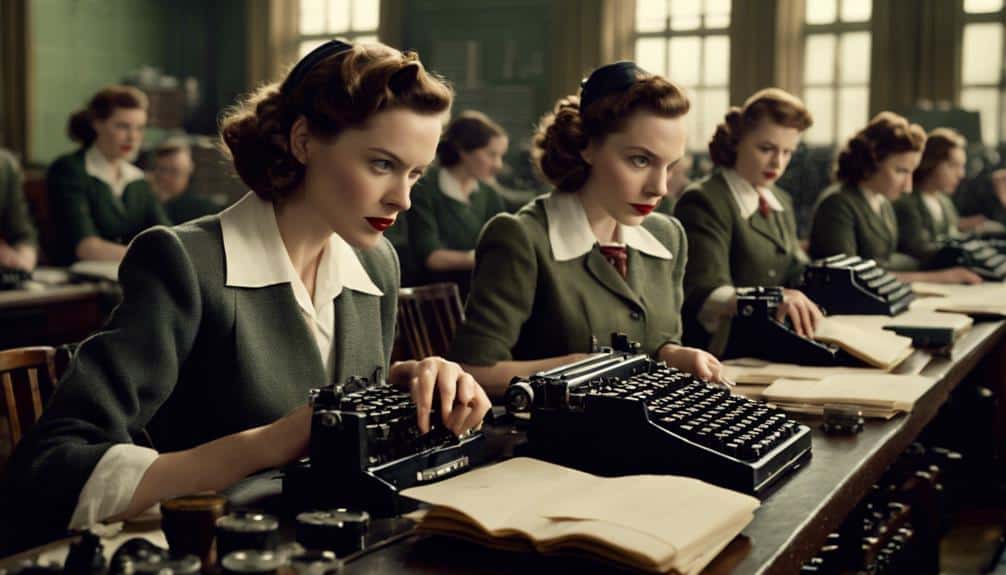
Research on women's roles at Bletchley Park reveals their indispensable contributions, as scholars like Sally Waugh, Gillian Sutherland, and Frieda Midgley have meticulously documented their pivotal involvement in the codebreaking efforts. These scholars have highlighted how women weren't merely supporting staff but were key code breakers during WWII.
Sally Waugh's research identified around 80 women from Newnham College who played vital roles at Bletchley Park. A 1939 letter confirmed the availability of Newnham College students for emergency work, showcasing the readiness and versatility of these women. Jonathan Byrne's findings further affirm these contributions by confirming their participation in key tasks.
Here are some key points about women's contributions:
- Diverse Expertise: Women from Newnham College brought a wide range of skills, including mathematics, linguistics, history, and archaeology, necessary for codebreaking.
- Critical Mass: Around 80 women from a single institution—Newnham College—were identified, underscoring the significant female presence.
- Early Mobilization: The 1939 letter indicates that women were ready to serve from the onset of the war.
- Recognition: Scholars' research confirms that the contributions of these women are now acknowledged and appreciated.
Understanding these facts sheds light on the vital roles women played in the success of Bletchley Park's codebreaking efforts.
Legacy and Significance
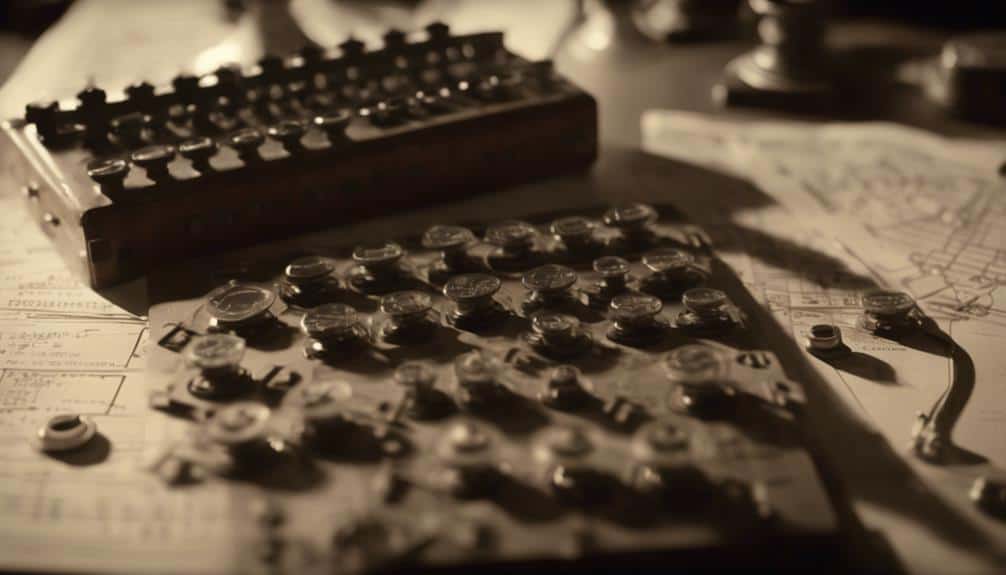
Bletchley Park's heritage emphasizes how the codebreaking endeavors, greatly supported by women like Joan Clarke and Mavis Batey, were pivotal in shortening WWII and shaping Allied intelligence strategies. Through their deciphering of Nazi secrets, these women played a crucial role in providing the Allies with strategic intelligence that ultimately turned the tide of the war.
Historians now acknowledge that without the contributions of women code breakers, the war might've continued for several more years, costing countless additional lives. These women, many of whom came from Newnham College, deciphered complex, scrambled communications that were essential to understanding enemy movements and strategies. Their work at Bletchley Park ensured that the Allied forces could anticipate and counteract Nazi operations effectively.
Today, the significance of Bletchley Park and its codebreakers is increasingly recognized, particularly the contributions of its women. The legacy of their dedication and brilliance is a testament to the critical role that strategic intelligence played in securing Allied victory.


